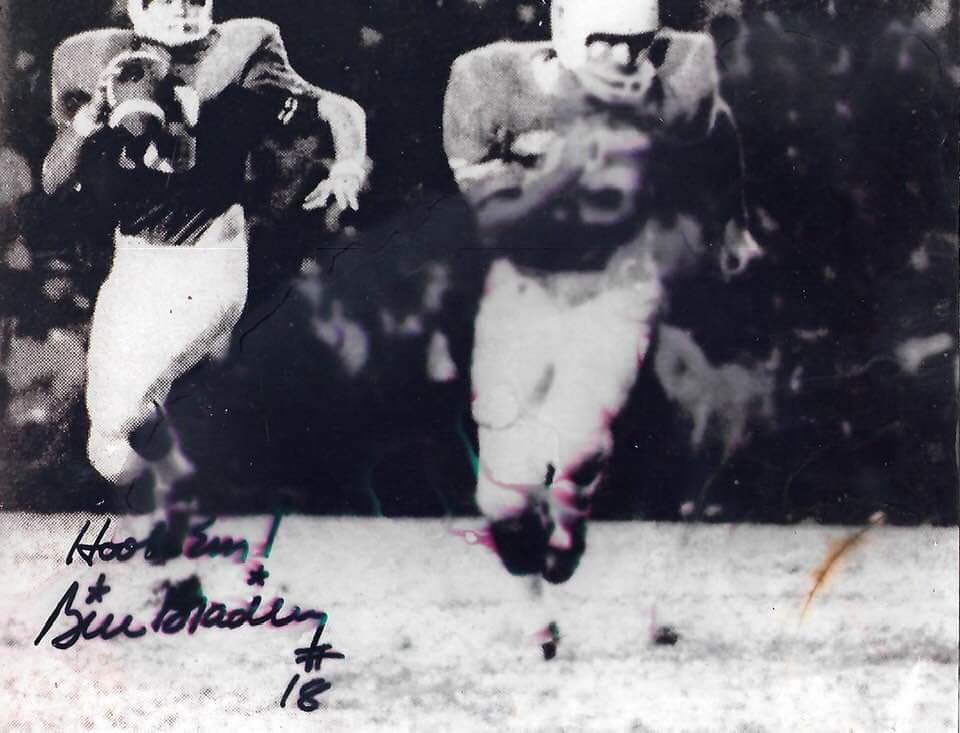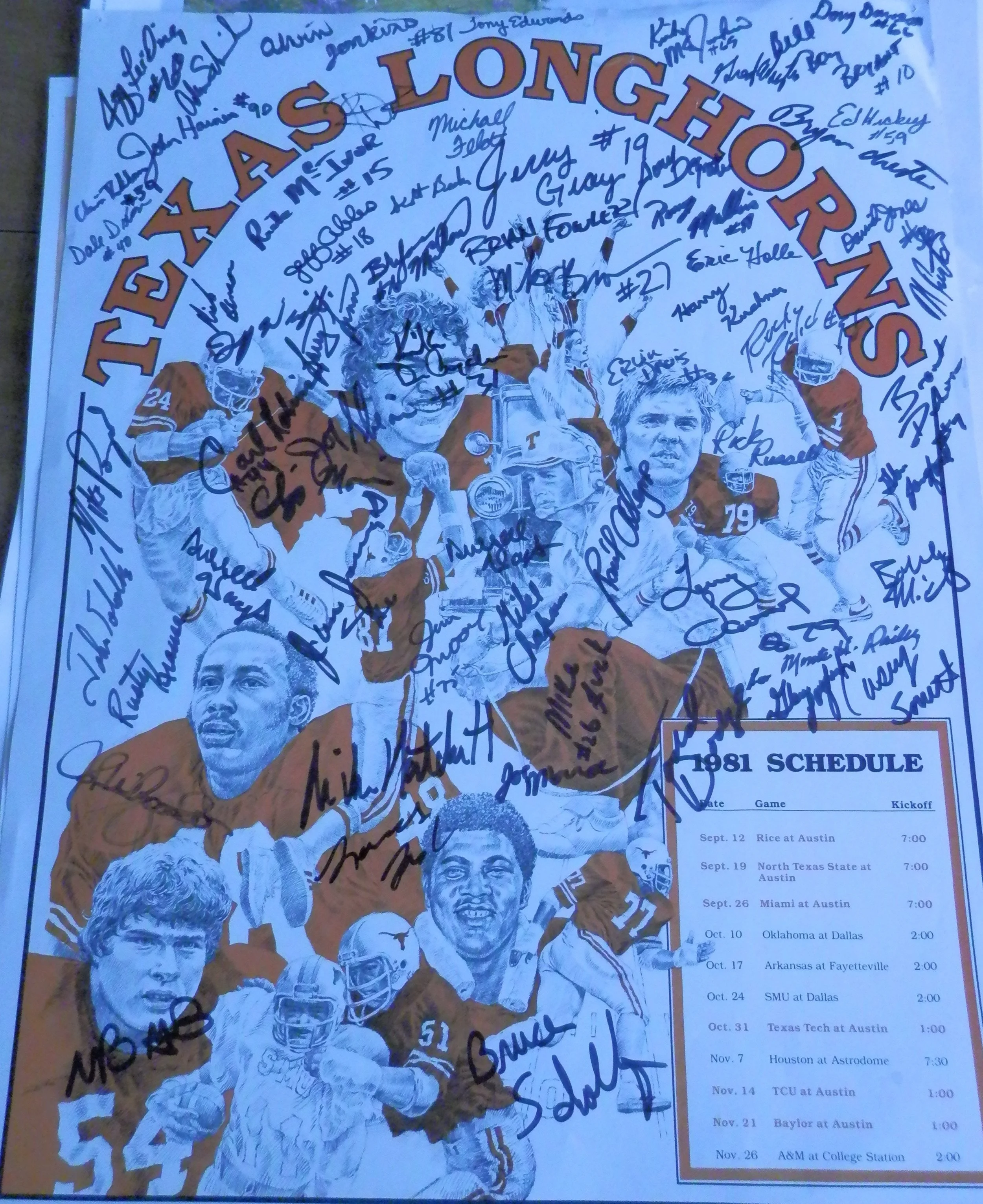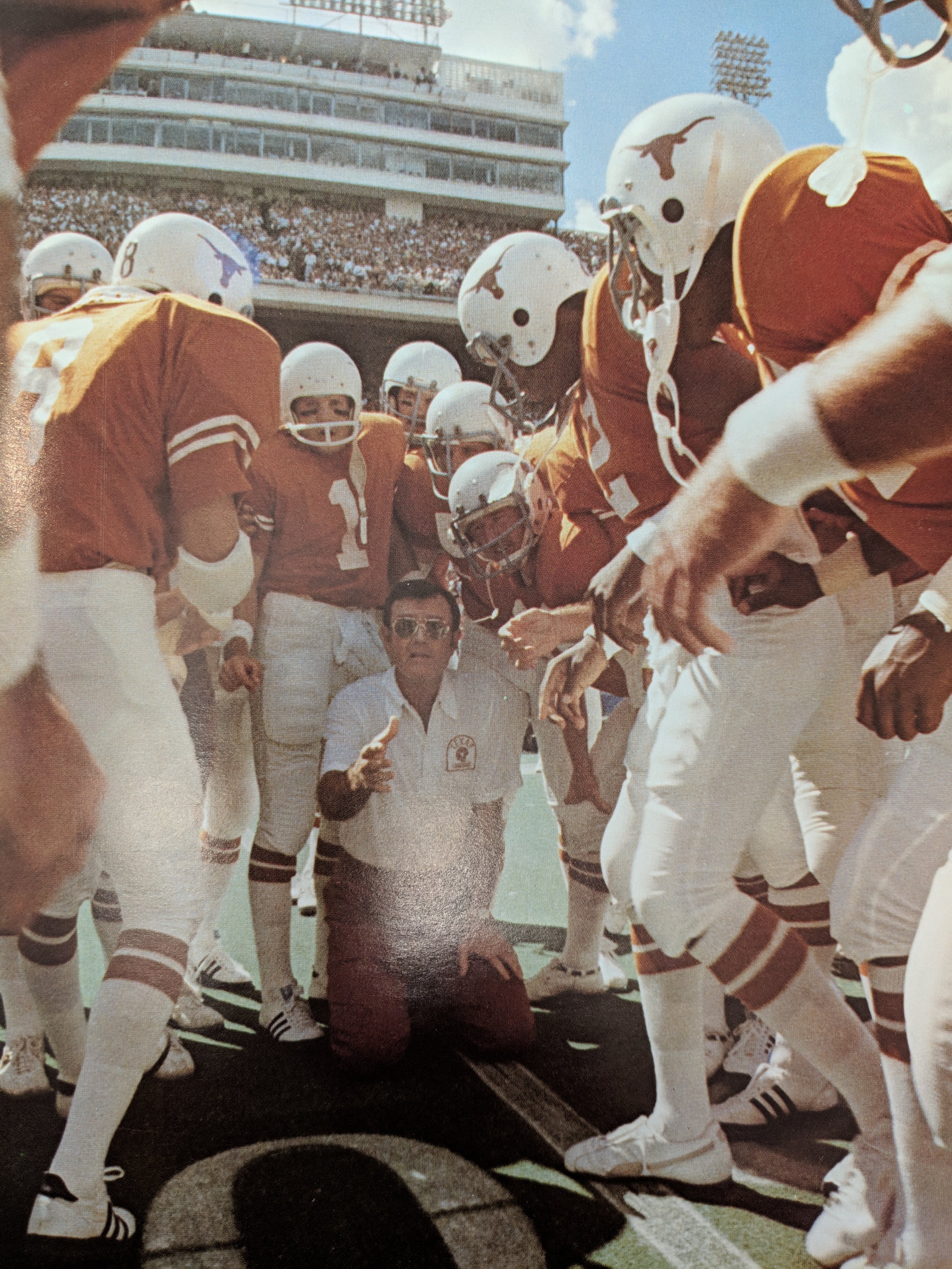I MISS TIE GAMES
by Larry Carlson (lc13@txstate.edu )
Paul "Bear" Bryant offered up long, long ago his disdainful judgment of any football game ending in a tie.
"A tie is like kissing your sister," the Bear said, of his lack of ardor for sixty minutes of football combat that decided nothing. Bryant's opinion was likely echoed by the great majority of coaches, players, fans
and media.
Maybe I'm the lone wolf among the pack who love and embrace college football's wretched overtime policies. Me, I miss tie games. And they got outlawed almost three decades ago.
While I was growing upward and older, the Texas Longhorns played in seven sister-kissers. I always shrugged off those ties. Both teams had sixty minutes to get a win. A tie could register as a massive upset for an underdog. Occasionally, a team with the ball ran out the clock, somewhat content to avoid taking a big "L."
1968 - Texas vs. Houston
In the debut game of the UT wishbone offense, September 1968, talented upstart Houston came to the Forty Acres with an upset in mind. They didn't get it, technically, even as the Cougars defense largely put the clamps on the Longhorns' nascent formation in a 20-20 deadlock.
1968 Bradley and Gilbert Houston 1968
Houston outgained Texas in total yardage, 408-314, and posted 22 first downs to only a dozen for the Horns. Bill Bradley was intercepted three times in just seven attempts in what would be his final start in Austin (and a bright future as an All-NFL safety). Texas had the ball late in the game, but Darrell Royal was in no mood to try anything daring. The home crowd booed the Horns for the lack of urgency.
As a footnote, Texas lost at Texas Tech the next week, but backup QB James Street came on in relief and showed sparks of good wishbone quarterbacking. He got his first start against Oklahoma State seven nights later and would finish 20-0 as the Longhorns' wishbone conductor. Texas won another ten straight with Eddie Phillips at QB, and the 30-game win streak reaped national titles in '69 and '70, along with a number three finish in '68 after what had started with a tie and a loss.
Upon further review, ties with Houston didn't ruin anything for Texas.
1981- Texas vs Houston
The fifth-ranked Horns of '81 journeyed to the Astrodome in November and trailed the unranked Coogs 14-0 at half. But they rallied for a third-quarter field goal and eleven fourth-quarter points to salvage a sis-kiss. Texas won four straight after that, including the Cotton Bowl date with Bama.
1966- Notre Dame vs Michigan State
Much more infamous than UT's low-key end to the '68 UH game is Notre Dame's 10-10 tie with Michigan State in 1966. The battle was billed as "The Game of the Century" and the top-ranked Irish, deep in Spartan territory with one minute to play, elected to run out the clock and smooch the tie.
Renowned Sports Illustrated writer, Dan Jenkins of Fort Worth, wrote that the game died "with enormous emptiness for which the Irish will always be blamed."
Maybe Coach Ara Parseghian knew how much the media, especially the Eastern writers, worshipped ND football. Both teams emerged with shares of the natty, as did Alabama. Neither Notre Dame nor MSU appeared in a bowl, while the Tide went 11-0, winning the Sugar.
Sometimes, back in the day, a tie really seemed like a win. Because the other guys didn't get one.
1948- Army-Navy
A famed case in point was the 1948 Army-Navy classic. The Black Knights of the Hudson came in at 8-0 while the Midshipmen from Maryland had zero wins to show in eight earlier games. The big fight ended in 21-21 tie. It's safe to say the Middies were figuratively kissing post-war pin-up gals, not their own sisters.
1962- Texas vs Rice
October 27No. 1 Texas
Rice Stadium
Houston, TX (rivalry)
Tie game 14-14 before 73,000 fans.
The tie game in UT records that proved most costly happened at Rice Stadium in 1962. Top-ranked, 5-0 UT played down to the level of the winless Owls. Neither team scored in the final ten minutes and Texas "lost," 14-14. The game was played barely a month after President John F Kennedy had made the now famous "We choose to go to the moon" speech at Rice. In that message, JFK had heralded challenges and asked "Why does Rice play Texas?" It wasn't because it was easy, the President emphasized, but because it was hard. Hard for the burnt orange, that is. The Flock flew high that muggy night and ruined what could have been the Horns' first perfect regular season. Texas went 9-0-1, then lost to LSU in the Cotton Bowl.
Perfection was delayed only a year, though. The Steers won everything in '63, putting a 28-6 whipping on number two Navy to seal the deal.
Let it be noted that dirty Rice did Texas a sizable solid with another tie, nine years later.
1971 - Arkansas vs. Rice
Arkansas had plastered a very beat-up Longhorn squad in 1971, looking to be virtually unbeatable for the Southwest Conference title. It still looked that way late in the season, even after a horrible A&M team upset the Hogs. But then in Houston, the Owls, 2-5, managed a 24-24 tie with Arkansas.
Texas won out after the mid-October debacle in Little Rock. Thanks to the Horns resilience, and to that plucky Rice crew, UT won its fourth-straight SWC crown. By a one-half game margin.
If you ask Texas fans of a certain vintage, say, those born after 1965, two nasty, mean, vicious ties rough up the wardrobe and still rankle. Both came against Oklahoma.
1976- Texas vs Oklahoma
The buildup to the 1976 contest was the strangest ever. Darrell Royal's Texas teams had won 12 of the first 14 matchups against his alma mater. But now OU had won five straight. Royal had called out Barry Switzer and his coaching staff for spying and cheating. Switzer had hooted derisively and mentioned that some coaches got outworked because they were busier with guitar-picking friends than with recruiting and football preparations.
Texas was offensively overmatched in '76, struggling with a walk-on QB as the starter. During warmups, Oklahoma fans rained down insults on Royal, waves of curses, boos, and taunts that washed over the former OU star like waves of putrid garbage.
Third-ranked OU had speed and talent aplenty. Somehow, Texas managed to make two Russell Erxleben field goals hold up for what looked like would make for a colossal upset. Midway through the fourth quarter, the Gibraltar-like Texas defense -- Lionell Johnson, Bill Hamilton, Brad Shearer, Steve Straty, Steve Collier, Lance Taylor, Ernest Lee, Paul Jette and others -- had held the Sooners to a mind-boggling two first downs. Two.
And Texas had the ball. But then came a fumble. Oklahoma came alive and slowly pushed down the field on a bone-weary band of Longhorns. With under four minutes to go, OU punched in the tying touchdown.
A supreme effort by Texas had gone for nothing, for a sixth straight loss to their arch-rivals. So it seemed.
But Lionell Johnson, the senior from Winnfield, LA who was in on an astounding 23 tackles this day, had one more ace in the hole. As OU lined up for a surefire extra point, Johnson told the snapper that he was going to hike this one over the holder's head. The bold prophecy came true. The snap went haywire and the game remained tied. It ended that way and an eerie silence shrouded the Cotton Bowl and even the State Fair midway. Nobody was celebrating.
"We lelt like we controlled the game," linebacker Lance Taylor told me last year. "Then one mistake (the UT fumble) and it's tied. I think everyone was in shock," he summed up.
Coach Royal left the floor of the ancient Cotton Bowl for the last time, stopping to dry heave.
His Longhorns would finish 5-5-1, the only non-winning record for DKR's twenty years at Texas.
Less than two months after the tie, Royal retired from coaching at the age of 52.
It was eight October's later when another tie game in Dallas weighed heavily on a Texas coaching career.
Fred Akers' Horns had won five of the first seven duels with former Arkansas teammate Barry Switzer's Sooners. Switzer's mouth had largely been washed out with lye and muzzled when it came to Texas.
The burnt orange had gone 11-1 in '83, with an improbable 10-9 loss to Georgia in the Cotton Bowl wasting a possible perfect record and national title.
1984- Texas vs OU
Come October '84, UT was number one in the polls, OU at number two. The game was played in relentless rain on a dark, gloomy afternoon that would dampen not just Fletcher's corny dogs and cotton candy but the trajectory of Longhorn football.
UT All-America kicker, Jeff Ward, recalled to me in a TLSN interview last year that the buildup to the big game was even hotter than usual. Besides the 1-2 punch in the rankings, Texas had already beaten eleventh-ranked Auburn and bullied fourth-ranked Penn State, 28-3. There was plenty of trash talk between Austin and Norman.
"You might even say that week created the character that became 'The Boz' (OU linebacker Brian Bosworth, from Irving MacArthur)," Ward said. "His comments were posted all over our locker room but we had no idea who he was."
Texas took it to the Boz and his Okies early on. A 25-yard TD pass from Todd Dodge to Bill Boy Bryant gave Texas an early 7-0 lead. The Horns expanded the advantage to 10-zip at half, thanks to a 40-yard FG by Ward. The Sooners stormed back in the rain, taking a 15-10 lead to enter the final quarter.
One thing in particular that Ward said gave chills to this writer. It came after he claimed he had never played in a more intense, chaotic game.
"Neither of us played very well but the game was played in a very angry way, and the entire stadium had an angry vibe, for good reason."
Some might say that the Texas-OU series runs on angry vibes for high octane fuel every play.
But Ward's assessment encompassed memories of the rivalry, the rankings, the incessant rain, the raging fan bases and what he said was the ongoing, futile search for a dry football, should Texas need a late field goal. Ward says every UT football seemed to weigh at least three pounds.
Fittingly, Texas did, indeed, move the ball late, better than they had since the opening period. UT had cut the gap to a field goal when OU snapped the ball out of the end zone for a safety with scarcely two minutes to go. Coach Akers had asked Jeff what he needed to get in range but Ward says now that Akers was intent on getting a touchdown and a win.
Midway through the last minute on the old Cotton Bowl clock, Ward was trying to prepare for a game-tying field goal, if necessary. But he remembered that it felt impossible to get ready.
"One, because I was soaked but two, the ABC-TV crew wouldn't get out of my face," Ward explains. Texas was at the OU 15-yard-line with barely double digits remaining. Ward headed out to do his duty.
"Fred screamed at me, 'Get back here,' and then I heard him discussing another play...a fade route to the corner. Given the time left, most of us looked at each other in shock."
Almost forty years later, every OU fan will tell you the ensuing pass was intercepted in the end zone, sealing what would've/could've/should've been a victory for the Sooners. Longhorn backers believed there was interference. You can watch the replay on YouTube starting at the 48:22.
But the game officials called it an incomplete pass and Jeff Ward came on to attempt a 32-yard field goal.
"I jogged out to a scene of total chaos," Ward testifies. He recalls at least 30 people out on the field, pleading the case for both offense and defense. "Barry Switzer tried to run out on the field in a fit, but he tripped over the headset wires. He went ballistic."
The officials worked hard to restore order, and Ward remembers worrying that the soggy pigskin was getting wetter, heavier every second. His snapper, Terry Steelhammer, told him that no, the ball wasn't gonna be dry. It wasn't. But Steelhammer whipped the snap and Ward lifted a 32-yard field goal for a 15-15 tie as time expired.
"The next thing I see is Barry Switzer running by me to chase the referee up the tunnel," Ward says.
"Even better, the ball we used to make the kick was stamped with Oklahoma. It was their ball and it weighed five pounds."
Ward's memory of the post-game locker room was that Akers was furious that the Horns hadn't won, and said he wished the rivals could "settle it in the street."
No kiss from a sister desired.
Lest we forget, if OU was robbed by the no-call of a potential interception, Texas had been victimized earlier when the Oklahoma punter knelt -- touching his knee to the ground -- to field a snap, and the punt was allowed. Texas should have been issued the football some fifty yards upfield from where they got it.
No matter. For thirty-nine years, the tie score has been etched in the Texas-OU series record. It won't be erased by cancel culture. No golden hat for anybody.
But the fates turned on Texas football soon after the ill-fated day when the hard rains pounded Big D.
Though the Horns won their next three and were ranked number three with a 6-0-1 mark in early November, doom awaited. Texas lost to Houston, bounced back to beat #12 TCU but then fell to Baylor to close the month.
It got worse when the 7-2-1 Steers hosted Jackie Sherrill's Aggies on the first of December.
Texas had whipped ass on Sherrill's first two A&M teams, 53-16 and 45-13. This time around, an uninspired UT squad lost 37-12, the worst home loss ever to the Ags.
Disgruntled players were ready to end the season at 7-3-1. But UT accepted a Freedom Bowl bid to play in Anaheim and got embarrassed, 55-14, by Iowa.
Again, let Jeff Ward interpret. "Two things jumped out about our meltdown...one was agents' influence over players' and their future (NFL) prospects and two, all of a sudden programs that were lacking talent were light years better. We had quite a few NFL prospects and they, rightly, made little effort in our meaningless bowl game. And we were starting to lose talent. Our backups to those NFL prospects were not future NFL players themselves," Ward opines. "Playing in a bowl game that year was a bad idea and it was used against Fred later on."
Akers' Longhorns went 8-4 the following season, losing 14-7 to OU and 42-10 to A&M, and were physically whipped by a tight, light Air Force team in the Bluebonnet Bowl. In '86, the Horns stumbled to 5-6 for their first losing season in thirty years, just before Darrell Royal was hired.
Coach Fred Akers, so close to national championships in 1977 and 1983, was finished at the Forty Acres.
Looking back, it is easy to wonder how the fortunes of Texas football might never have wavered had that fade route against OU been successful. In the 39 years since Texas went 11-0 in the '83 regular season, UT football teams have corralled a mere five conference championships.
All that aside, I still say ties were better than overtime. They counted. Sometimes you won, sometimes you lost, and sometimes you did neither. But a tie could still make or break a season and a team. Perhaps
even a career.




